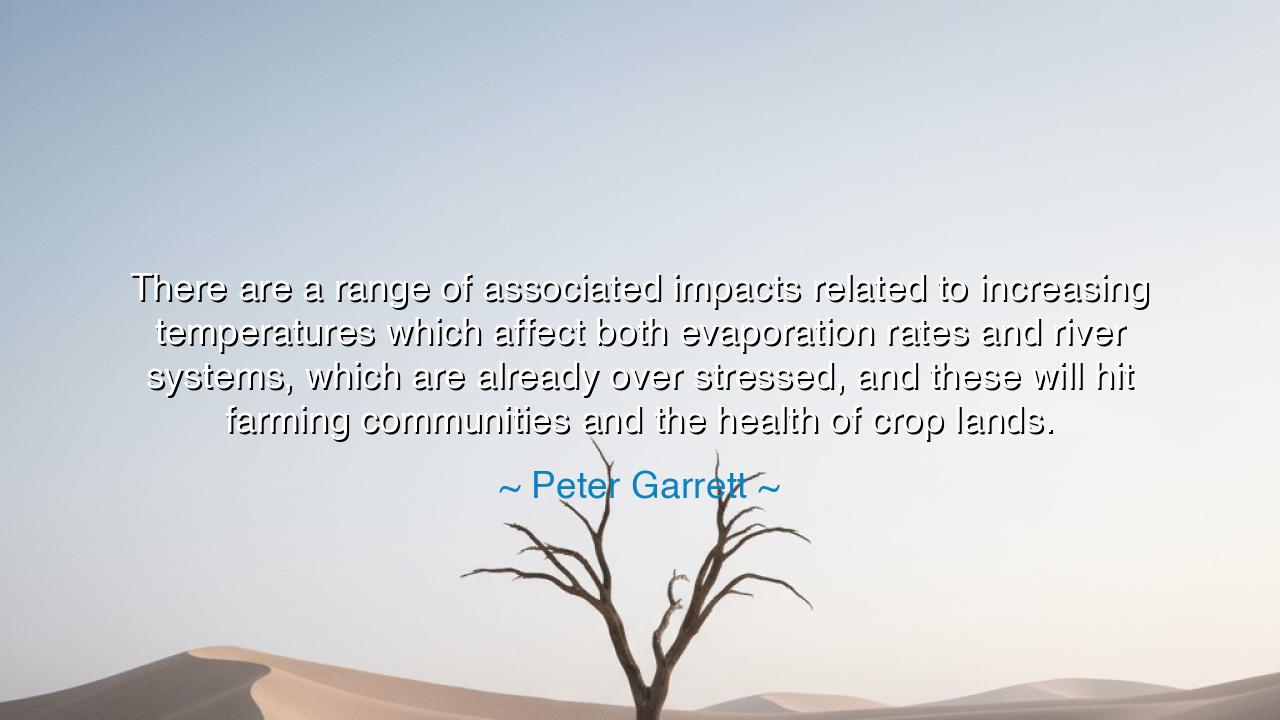
There are a range of associated impacts related to increasing
There are a range of associated impacts related to increasing temperatures which affect both evaporation rates and river systems, which are already over stressed, and these will hit farming communities and the health of crop lands.






The words of Peter Garrett — “There are a range of associated impacts related to increasing temperatures which affect both evaporation rates and river systems, which are already over stressed, and these will hit farming communities and the health of crop lands.” — carry the weight of a warning carved into the stone of time. His message is not merely scientific; it is prophetic. Beneath the language of ecology lies a moral truth: when nature weakens, humanity follows. In this quote, Garrett speaks as one who sees beyond charts and thermometers — he speaks as a guardian of the Earth, reminding us that the health of our rivers, our soils, and our skies is bound to the health of our souls.
In the ancient world, water was revered as sacred. The Egyptians built their lives around the rhythm of the Nile; the Chinese honored the Yellow River as the “cradle of civilization”; the Greeks saw rivers as gods flowing through the veins of the Earth. They understood instinctively what modern society forgets — that to wound the waters is to wound life itself. Garrett’s words are the echo of that lost reverence. He warns that the rising heat of our age, born of human excess, is not a distant threat but a living wound. Each degree of temperature gained draws moisture from the land, each drought tightens the noose around those who depend upon it — the farmers, the herders, the keepers of sustenance.
The origin of his reflection lies in his long-standing role as both environmental advocate and public servant in Australia, a land of vast deserts and fragile ecosystems. There, rivers like the Murray-Darling Basin, once the lifeblood of the continent, now suffer from overuse, pollution, and declining rainfall. Garrett witnessed firsthand how climate change transforms abundance into scarcity, how rising temperatures evaporate rivers faster than they can be replenished, and how the dreams of generations of farmers turn to dust. His words are both lament and call to arms — for what begins in the field will soon reach the city, and the suffering of the land will one day become the suffering of all.
History offers a mirror to his warning. In the once-great Mesopotamia, the land between the Tigris and Euphrates — the birthplace of agriculture and civilization — overuse of water and the salting of the soil led to its fall. Crops withered, rivers changed course, and the empires that had risen from the fertile plains collapsed into barren memory. The same fate met the Mayans, whose forests were felled and whose lands dried under the sun of their own making. Garrett’s words remind us that such decline is not myth but pattern, repeating through time whenever humankind forgets its covenant with the Earth.
There is a deeper wisdom in his voice — a recognition that the environment is not a resource, but a relationship. When rivers dry and crops die, it is not only a loss of food but of spirit. The farmer’s despair, the cracked earth, the empty clouds — these are not isolated tragedies but symbols of imbalance, of human arrogance meeting natural consequence. Garrett’s language of temperature, evaporation, and overstress conceals within it a sacred plea: to remember that we are not masters of nature but its kin. The Earth does not belong to us; we belong to it.
His warning also carries moral fire for the modern age. We live in a time where progress is measured in profit, not preservation; where the cry of the soil is drowned by the hum of machines. Yet Garrett’s words call us back to responsibility — to restore rivers, to replant forests, to cherish water as our most precious inheritance. Every drop saved is a seed of life, every tree planted a hymn of gratitude. It is not enough to fear the drought; we must act to prevent it. To care for the land is to care for the generations unborn, whose voices we must hear even before they are born.
So, my children of this burning century, let this wisdom be your compass: the fate of humanity is written in the health of its waters. Guard them as you would guard your own breath. Learn from the ancient farmers who lived by the pulse of the seasons, who took only what the Earth could spare and gave back what they could. Turn your faces again toward balance — reduce, replenish, restore. For if we heal the rivers, the rivers will heal us.
Thus, Peter Garrett’s words stand as both elegy and commandment — a modern oracle’s call to awaken before the fields turn to ash. He reminds us that science without reverence is blindness, and that survival is not found in domination, but in harmony. The rivers are not dead yet; the soil still breathes; the sun still blesses the faithful. But the hour grows late. To save the Earth is to save ourselves, and the time for remembrance has passed — now is the time for renewal.






AAdministratorAdministrator
Welcome, honored guests. Please leave a comment, we will respond soon